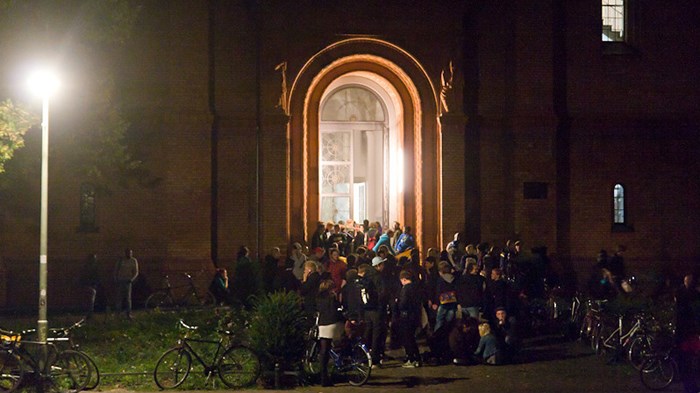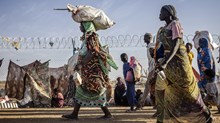
Up to one million refugees are expected to arrive in Germany by end of this year, hoping to gain asylum in the European Union’s largest country.
Many are arriving from Muslim-majority countries, including Syria, Afghanistan, and Iran. But while German churches have been eager to materially support the refugees, Christians aren’t on the same page about sharing the gospel with newcomers.
One prominent denomination has claimed in a position paper that trying to evangelize refugees is unchristian, reports Religion News Service. “A strategic mission to Islam or meeting Muslims to convert them threatens social peace and contradicts the spirit and mandate of Jesus Christ and is therefore to be firmly rejected,” said the Evangelical Church of the Rhineland in a paper entitled “Pilgrim Fellowship and Witness in Dialogue with Muslims, according to RNS.
A denomination of about three million, the Evangelical Church of the Rhineland is one of twenty Lutheran, Reformed and United Protestant groups that make up the Evangelical Church in Germany (EKD). According to the most recent figures, 23 million Germans are part of EKD, whose numbers have consistently declined in recent years.
German Evangelical Alliance secretary general Hartmut Steeb says that evangelism is an essential part of the response to refugees.
“We declare firmly that the fundamental missionary task of Christians, namely to preach the Gospel of Jesus to others and invite them to follow it, cannot be given up,” he told RNS.
Barbara Rudolph, who leads the ecumenical department of the Evangelical Church of the Rhineland, told Die Welt that her church’s stance is a "modern interpretation of missionary work."
Part of the strategy is asking members of the Church to live lives that impress would-be Christian converts.
“We want to live in a way that makes others curious about our faith,” she told RNS. “Whoever wants to become a Christian can be baptized.”
Rudolph also pointed to recommendations signed by the World Evangelical Alliance, the World Council of Churches (WCC), and the Vatican in 2011.
“If Christians engage in inappropriate methods of exercising mission by resorting to deception and coercive means, they betray the gospel and may cause suffering to others,” it states. “Such departures call for repentance and remind us of our need for God’s continuing grace.”
Complicating the issue is that Muslim refugees have a political incentive to convert.
In at least two countries the asylum seekers are fleeing—Iran and Afghanistan—converting to Christianity is punishable by death.
Refugees may wager that they’re less likely to be sent back to their birth countries should they convert. After all, many aren’t allowed to stay.
“In recent years, roughly 40% to 50% from those two countries have been allowed to stay in the country, with many of those getting only temporary permission to remain,” reported RNS.
This is not only true in Germany.
In 2013, Sweden was accused of denying religious refugee status to Iranian Christians and sending them back to their home country. (CT also noted when Lutheran bishops in Sweden controversially advised priests not to baptize asylum seekers who had converted to Christianity over fears that this could increase their likelihood of being persecuted if they were sent back.)
In Berlin, where hundreds of Muslims have converted to Christianity at an evangelical church, its pastor acknowledges that some may have political motives behind their faith decisions. (CT first profiled his ministry in 2012. The Wall Street Journal also offers an in-depth look and the Associated Press, this video report.)
"I know there are—again and again—people coming here because they have some kind of hope regarding their asylum," Trinity pastor Gottfried Martens told the Associated Press. "I am inviting them to join us because I know that whoever comes here will not be left unchanged."
Relations between Christian and Muslim refugees have been contentious. One Iranian Christian convert was beaten by an Afghan man who reportedly saw this change as sinful, according The Express. German police unions have also called for religiously segregated housing, reportsThe Washington Post.
Christians have been prevented from using asylum center kitchens and harassed for not praying, Martens toldDie Welt.
“[The Christians] ask the question: What happens when the devout Muslim refugees leave the refugee center, must we continue hiding ourselves as Christians in the future in this country?” he said.
Some European churches have downplayed their Christian identity in deference to the refugees they are assisting. One German church that will be hosting 50 refugees will move its chairs, pulpit and font, reports the Express. Earlier this year, a top bishop in the church of Sweden instructed churches in her diocese to remove crosses.
CT previously offered two perspectives on allowing Muslims to worship in churches. Ed Stetzer has also offered five practical ways for Christians to reach out to westernized Muslims.
There are instances where religious agencies have taken advantage of people in a vulnerable position, wrote Theos, a Christian think tank in the United Kingdom, earlier this year.
“The vast majority of religious voices are clear that there is no justification for making the provision of aid or assistance conditional on expressing religious beliefs. .... It’s right to acknowledge vulnerability, which will be a more or less important consideration depending on the context, but an approach which ‘vulnerable-ises’ will result in a failure to take proper account of spiritual needs.”
Elsewhere in Europe, Croatia’s Christian leaders have reached out to the nearly 30,000 refugees who have entered.
“God’s given us an amazing opportunity,” Teanna Sunberg, NCM communications coordinator for Central Europe, said. “He’s brought the Muslim world to our doorstep.”
CT’s past coverage of Germany includes interviews with a cabinet member in chancellor Angela Merkel’s government about evangelical political engagement, a German church planter who studied under Tim Keller, and a Berlin-based journalist who says that Martin Luther would have driven most of Germany's bishops from their pulpits.
CT has also noted why the refugee crisis makes for a beautiful gospel witness, as well as how Jordanians are meeting the needs of Syrians hailing from the worst crisis since the Rwandan genocide.

Support Our Work
Subscribe to CT for less than $4.25/month


















